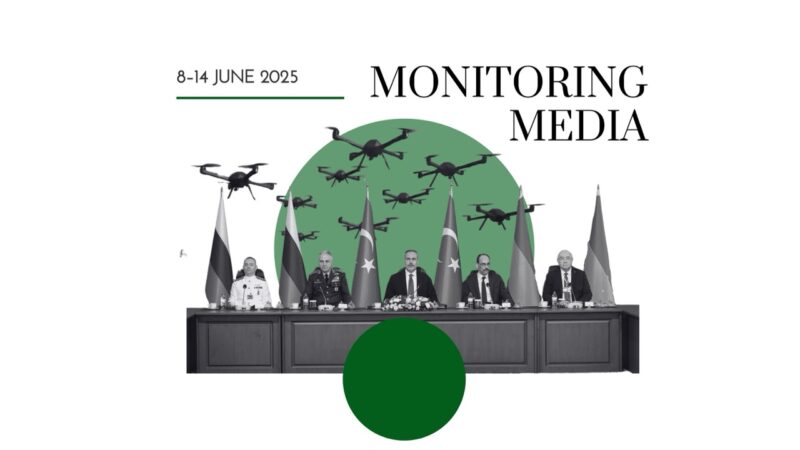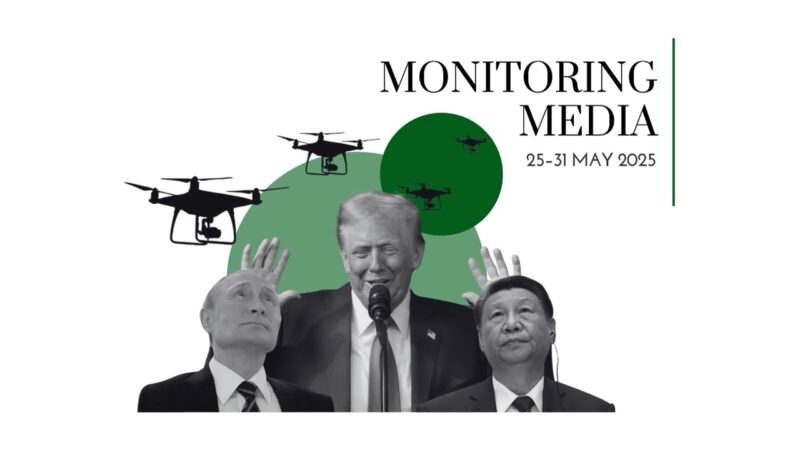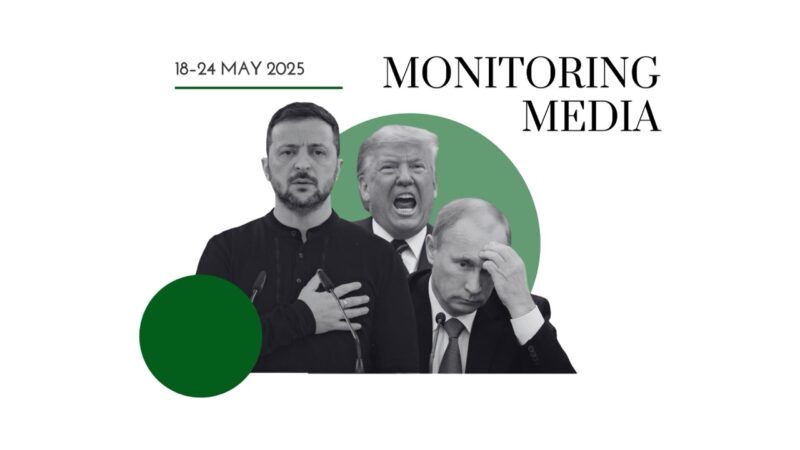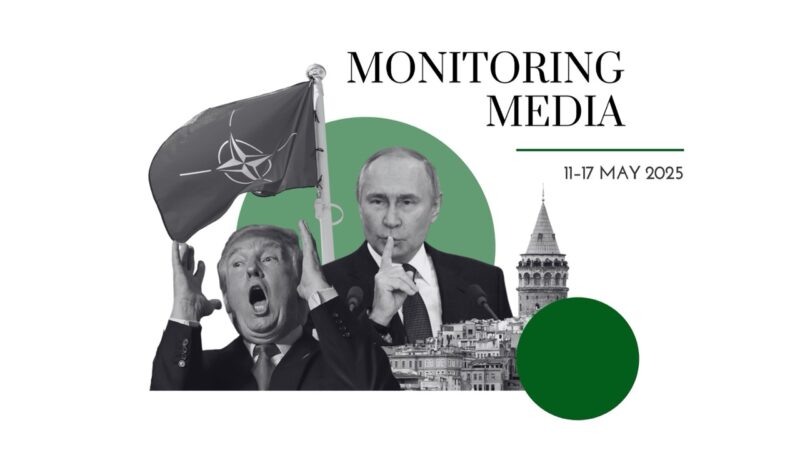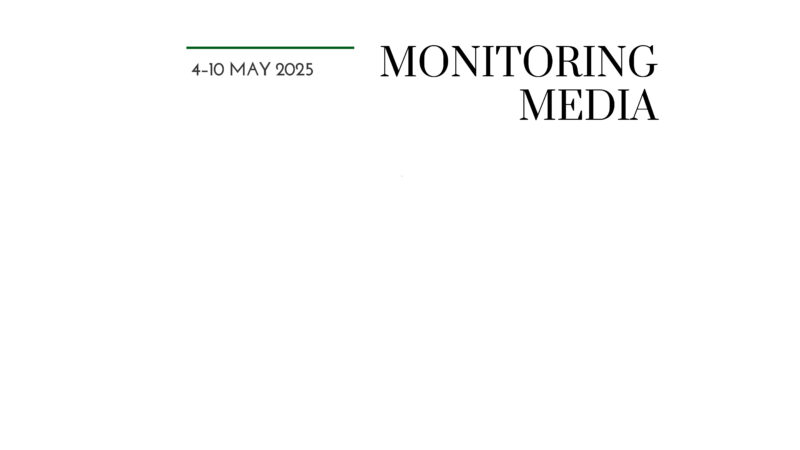NATO must be prepared for a prolonged confrontation with Russia

CIUS weekly report on North American media coverage of Ukrainian affairs, 21–27 July 2024
Seven publications (The National Interest, Foreign Policy, Foreign Affairs, Ottawa Citizen, the Canadian Press, The Hill Times, and the New York Times) were selected to prepare this report on how Ukraine has been portrayed in the North American press during the past week. The sample was compiled based on their impact on public opinion as well as on their professional reputation, popularity among the readership, and topical relevance. These publications represent centrist viewpoints on the political spectrum.
This MMS report covers only the most-read and relevant articles about Ukraine, as ranked by the respective North American publications themselves in the past week. Its scope covers promoted articles on home pages and articles from special sections on Ukraine, with the hashtag #Ukraine, from the paper editions of the publications, and about Ukraine from opinion columns and editorials.
Featured topics
- The world and Ukraine: NATO must be prepared for a prolonged confrontation with Russia; a roadmap to stop Russia’s war against Ukraine; the right way to end the Russo-Ukrainian war.
- Russia at war: Shifts in US politics could align with Putin’s expectations on Ukraine.
MMS summaries
NATO must be prepared for a prolonged confrontation with Russia. Jack Detsch (Foreign Policy) emphasizes that NATO needs to develop a political strategy to counter Russia, which is likely to remain hostile to the alliance in the future. Russia is already “putting pressure on the West to break its consensus over Ukraine and soften anti-Kremlin tilt.” In recent years, Moscow has launched more coordinated hybrid attacks than have been seen at any time since the end of the Cold War: “That effort has included cyberattacks, sending waves of immigrants to the border with Finland, removing border buoys along the Narva River with Estonia, suspected arson attacks, and assassination plots.” Another hostile move by Russia to undermine NATO is the build-up of its armed forces within Ukraine: “NATO expects Russia to field thousands more troops—to fight in Ukraine or elsewhere—by the time that the alliance’s new Russia strategy is ready.” According to the author, Moscow expects to be able to maintain a wartime economy for at least another three to four years, unlike Kyiv: “Putin is banking on exhausting Ukraine with Russia’s greater numbers of troops and resources—even if there’s a staggering cost in lives.” The alliance should exit peacetime mode and be ready for a tough confrontation with Russia at any time. According to Detsch, “That’s a stark contrast from where NATO allies have been for decades: letting war plans and troop contingents on the eastern flank atrophy.”
A roadmap to stop Russia’s war against Ukraine. Zalmay Khalilzad (National Interest) suggests that possible changes in the White House could become a catalyst for peace talks between Russia and Ukraine. Although Ukraine has thus far not been able to completely drive Russian troops from its territory, it now has “more weapons, including weapons capable of striking Russian soil, and it has the green light from its allies to deploy those at least selectively. Ukraine has inflicted damage on the battlefield and inside Russia. [Kyiv] also produces more weapons at home and has economic and security commitments from several countries, including the United States.” Moscow has an advantage over Kyiv, but it has also suffered extremely serious losses: “Russia has sustained more casualties than those on the Ukrainian side. Many young, technologically skilled Russians have left the country. Ukrainian drones have attacked Russia’s infrastructure. The war is now within Russia itself, making Russians more alert to the conflict. The war has also damaged Russian relations with much of the international community, and the costs of sanctions imposed on it have been significant, including the loss of a large part of its formerly lucrative energy market.” And these losses have made Russia dependent on China, North Korea, and Iran. According to the author, any peace initiative should answer four key questions. First is the issue of territory, which is critical for both sides. The working algorithm for solving this problem envisages the following steps: (1) Russian troops retreat to the territories that Moscow controlled as of 23 February 2022; (2) Ukraine agrees not to use force to liberate these territories, but to seek only a diplomatic way to return them; (3) the remaining areas of Ukraine currently occupied by Russia will be administered by a UNSC-mandated administration for ten years, after which a referendum should be held to decide on their future. Second is the issue of security guarantees for Ukraine. There are several options: (1) Ukraine accedes to NATO; (2) Ukraine receives security guarantees from the EU and the two European nuclear powers, France and the UK; and (3) a defence treaty between the US and Ukraine “of the kind we are considering with Saudi Arabia.” Third issue is Ukraine’s recovery. Ukraine has suffered enormous destruction, therefore, Russia should also finance its reconstruction: “A portion of the frozen Russian assets might be allocated to reconstruction.” Fourth issue is Russia’s diplomatic standing: “For Russia, an essential motivation in agreeing to any Ukrainian settlement will be the benefits of future relations with the West and particularly with the United States.” According to Khalilzad, “The United States has significant leverage over both Russia and Ukraine. A new administration has an opportunity to use that leverage effectively. The discussion, analysis, and debate on settlement options and how best to pursue them should start now.”
The right way to end the Russo-Ukrainian war. Jakub Grygiel (Foreign Affairs) is convinced that instead of abandoning Kyiv, Washington should give it the tools to win. The US’s incrementalist approach to supporting Ukraine has not worked. On the contrary, it has only led to a prolonged war of attrition in which Kyiv has little chance of victory. Hasty negotiations with Russia could turn out to be one-sided and not in favour of Ukraine or the US. The author believes that the war needs to end—and end quickly: “To make that outcome possible, Washington and its allies must substantially and speedily improve Ukraine’s military position with a large infusion of weapons—and place no restrictions on their use. The most realistic chance for peace will come if Ukrainian troops can launch a decisive push that sends Russian forces back across the pre-2022 lines.” Such a step would guarantee peace in Europe and limit Russia’s revanchist imperial ambitions. According to Grygiel, “Even in the best-case scenario, there is no reason to expect a defeat of Russia so dramatic as to fundamentally alter Moscow’s strategic outlook. Russia will remain a powerful nuclear state, nurturing deep aspirations to restore its imperial greatness. But to achieve that goal, it needs Ukraine, which would give it the ability to threaten the rest of Europe and hold sway over European politics. Without Ukraine, Russia is only an Asian power, swiftly losing ground to China. Kyiv cannot change Moscow’s strategic imperatives with victories on the battlefield, but it can deny Russia control of its [sovereign neighbour]. A rapid and significant supply of Western arms would give Ukraine its best chance to push back Russian forces and create the space and the time it needs to rebuild, refit, and deter another Russian advance.”
Canada’s government was warned of ‘significant precedent’ with Ukraine visa program. Citing newly released court documents, Laura Osman (The Canadian Press) writes that federal immigration officials warned the Canadian government that the design of the emergency visa program for war-displaced Ukrainians (CUAET) could undermine the temporary immigration system. Immigration Department staff reportedly raised concerns in a memo to then-immigration minister Sean Fraser, emphasizing that waiving the requirement for Ukrainians to promise to leave when their visa expires would set a significant and potentially problematic precedent. The immigration officers warned that “waiving the need for a client to establish temporary intent would set a significant precedent that is not recommended, given that it would undermine a foundational component of the (temporary resident) legal framework.” The court documents, disclosed as part of a lawsuit filed by three Afghan Canadians (who served as language and culture advisers during the Afghanistan war but have not been able to bring their family members to safety) reveal concerns about disparate treatment of Afghan and Ukrainian refugees. The government maintains that the emergency program for Ukrainians is unique due to the nature of the war and Canada’s relationship with Ukraine, while emphasizing that the Ukrainian program is intended to be temporary. Canada has approved approximately 962,600 emergency visas for Ukrainians since the 2022 escalated Russian invasion, allowing them to work and study in the country. The program was well received, with many Canadians offering housing and donations to help the Ukrainians settle. Around 298,000 Ukrainians have travelled to Canada, though it is unclear how many have stayed or applied for permanent residency, or how many have left the country already.
Time for Canada to expel Russian diplomats, designate Russia as a terrorist state. Stanley Kutcher and Marcus Kolga (The Hill Times) write that the Russian bombing of the Okhmatdyt Children’s Hospital in Kyiv on July 8 represents a severe escalation in Russia’s genocidal war against Ukraine. Video footage shows deliberate strikes by Russian missiles—including a likely KH-101 cruise missile—on the hospital, which is on par with the Toronto’s SickKids Hospital. This strike is part of a broader pattern of violence, with the World Health Organization documenting 1,878 attacks on Ukrainian health-care facilities since February 2022. The deliberate targeting of children underscores a brutal campaign of terror that has included systematic kidnapping and indoctrination of tens of thousands of Ukrainian children in the occupied territories and Russia itself. The international community, including Canada, has been criticized for its inadequate response to these atrocities. The Czech foreign minister condemned the attackers as “the dregs of humanity,” and similar reactions are urged from other Western nations, including Canada. The authors argue that Canada should expel Russian diplomats and declare Russia a state sponsor of terrorism. They quote the émigré Russian political activist Garry Kasparov, who declares, “There is no justification for the presence of so many agents of the Putin regime in Canada. Russia is a terror state waging war…Canada must not live in denial of this truth and must stand against Russia’s terrorist regime.”
Shifts in US politics may align with Putin’s expectations on Ukraine. Anton Troianovski (New York Times) argues that an evolving American foreign policy landscape could align more closely with Russian leader Vladimir Putin’s expectations, as recent political developments in the US indicate a shift toward isolationism. With former President Donald Trump and his running mate, Senator J.D. Vance, expressing strong criticism of continued US support for Ukraine, there is growing concern that Washington might reconsider its commitment to Kyiv. Trump’s rhetoric, which includes warnings of “World War III” and promises to end the war with Russia, reflects a broader trend of American inwardness. The author quotes Russian analyst Dmitri Trenin, who suggests that Putin’s strategic view is that “at some point, Americans will get tired,” implying that Russia’s strategy is based on the belief that US public opinion will eventually lead to a reduction in support for Ukraine. However, Troianovski also notes that Putin’s past predictions about American policies have frequently been proven wrong. For example, the Kremlin’s expectations were confounded when Trump, despite his alignment with Russian interests, ended up imposing sanctions and providing military aid to Ukraine. Even now, while Putin might be cautiously optimistic due to the apparent waning focus on Ukraine in US politics, the author also cites analyst Ivan Timofeev, who stresses that “the relationship (between the countries) is bad, and gradually getting worse,” suggesting that the deep-seated issues in US-Russia relations are unlikely to change quickly.
